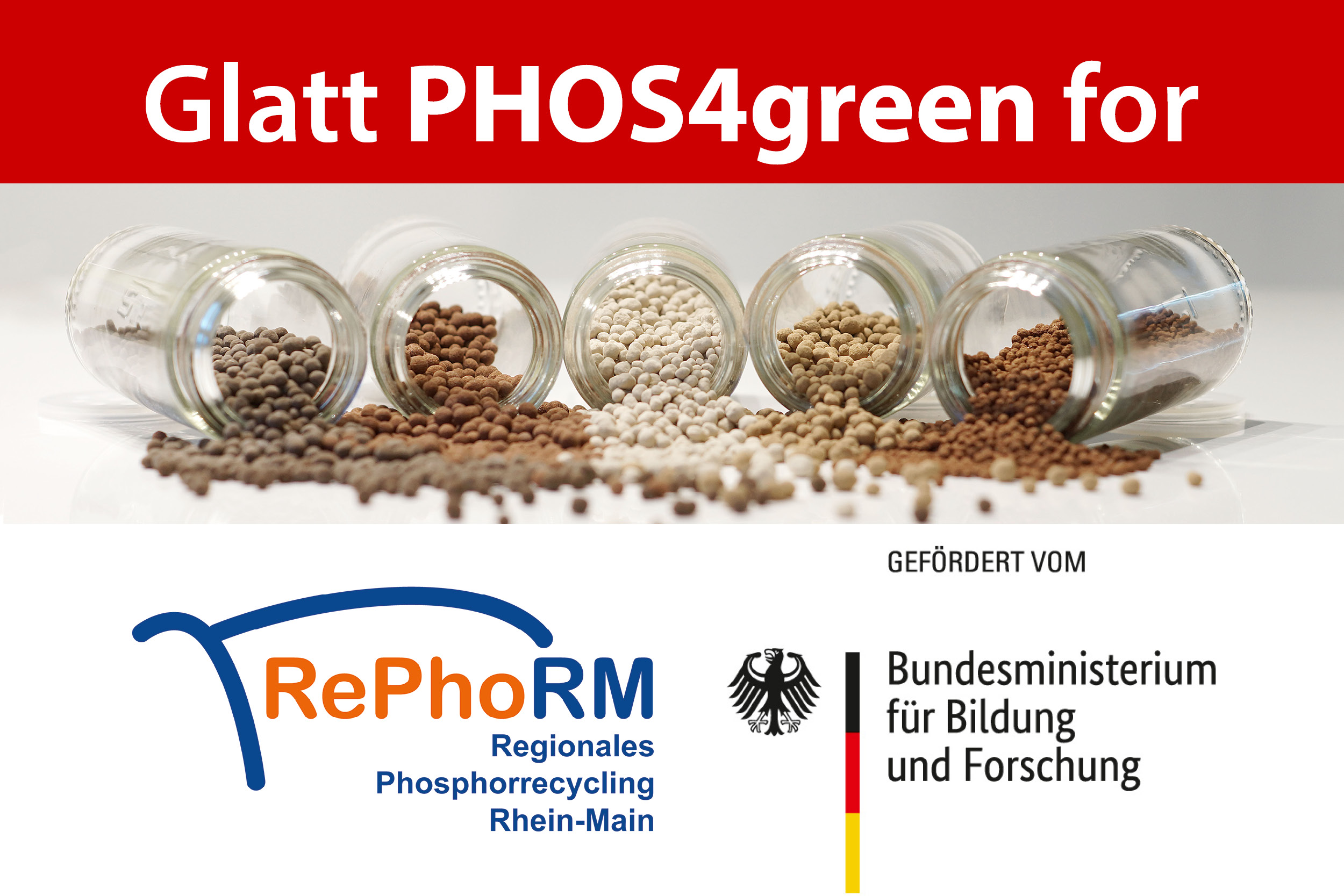
Glatt Ingenieurtechnik builds demonstration plant for heavy metal separation from sewage sludge ash in the Rhine-Main region
Weimar, September 5th, 2020: How can waste management companies in the Rhine-Main economic region join forces and make phosphorus recyclable for the nutrient cycle, as required by law from 2029? This question is being addressed by the nine players in the RePhoRM joint project. Glatt Ingenieurtechnik GmbH, a plant engineering company based in Weimar, Germany, is contributing its expertise to two subprojects: the planning and construction of a container plant in Industriepark Höchst and the studies on spray granulation of purified secondary phosphorus.
The plant will be used for process testing in the BMBF joint project “Regional Phosphorus Recycling in the Rhine-Main Region Taking into Account Industrial and Agricultural Material Cycles (RePhoRM)” led by Darmstadt Technical University with the goal of developing a large-scale phosphorus recovery concept for the metropolitan region.
Phosphorus is an essential building block in all living things and a major component of fertilizers for agriculture. In view of the world’s dwindling reserves, which cannot be replaced by anything else, German law requires sewage treatment plant operators to recover the valuable raw material from sewage sludge from 2029. The amended Sewage Sludge Ordinance in 2017 has led to intensive research into concepts suitable for closing the material cycle. Glatt, for example, has presented “PHOS4green,” a two-stage process that breaks down phosphorus from sewage sludge ash and converts it into fertilizer granules that can be used directly. Since the large quantities of sewage sludge in urban areas are mainly thermally recycled and the phosphorus from the ashes has to be recycled, various methods were evaluated in the concept phase and the Thuringian process was ultimately selected.
As specialists in materials management, the scientists at Darmstadt Technical University’s Wastewater Engineering Department are also responsible for basic research and a large part of the analyses. The practical implementation will be carried out by Infraserv GmbH & Co. Höchst KG at Industriepark Höchst. Glatt is not only responsible for engineering, but also supplies the container modules. Sewage sludge or sewage sludge ash as well as extensive data and experience are contributed by the city of Frankfurt am Main – Stadtentwässerung Frankfurt am Main (SEF), Abwasserverband Langen/Egelsbach/Erzhausen (AVLEE), ENTEGA Abwasserreinigung and TVM Thermische Verwertung Mainz GmbH (TVM). Fraunhofer IWKS is focusing on recyclable material cycles and resource strategies and, in collaboration with Darmstadt Technical University, is developing the process that removes heavy metals from the ashes. The demonstration plant is used to test the adapted heavy metal separation from the sewage sludge ashes. In order to develop an environmentally friendly and resource-efficient technical solution, scientists from the Department of Material Flow Management and Resource Economics at the TU Darmstadt are accompanying the development process from an ecological balance sheet perspective from the very beginning. The legal and economic implementation of the recycling plan is being examined by the law firm Becker Büttner Held, which specializes in energy, water and infrastructure management.
The joint project RePhoRM is a research and development project funded by the German Federal Ministry of Education and Research (BMBF) and pursued within the framework of the funding program “Research for Sustainable Development (FONA3)”. The project executing organization is KIT in Karlsruhe.
Head of department Prof. Dr.-Ing. Markus Engelhart from TU Darmstadt says about the importance of the project for the Rhine-Main region: “We would like to proactively face the challenge and develop a suitable technical as well as organizational concept for phosphorus recycling. The project is of strategic importance for the metropolitan region, because not only agricultural but also industrial material cycles are being considered here. Given the challenges we face with regard to the phosphorus cycle, the collaborative efforts of all stakeholders are already very valuable at this point in time and are exactly the right signal for the future.”

 Copyright: Vogel Business Media GmbH
Copyright: Vogel Business Media GmbH Copyright: publish-industry Verlag GmbH
Copyright: publish-industry Verlag GmbH